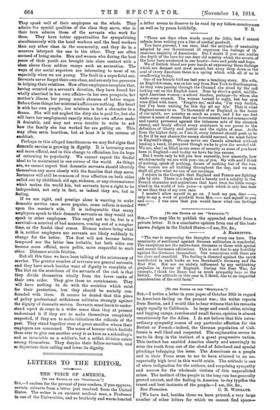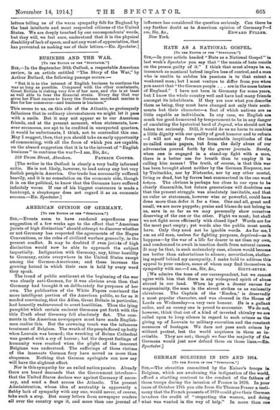[To TEN EDITOR OF MR "SPECTATOR•"1 notice a letter in
your paper of October 10th in regard to American feeling on the present war ; the writer reports from Boston, and I would like to bear witness that his remarks apply equally to California. In large and small cities, mining and logging camps, ranches and small farms, opinion is almost unanimously for the Allies. I do not believe that this extra- ordinary sympathy comes of any particular affection for the British or French—indeed, the German population of Cali- fornia is well liked and respected. The explanation seems to me to lie deep in the instinct of a great progressive nation. This instinct has enabled America clearly and unerringly to seize the truth from out of the cloud of falsehood and special pleadings befogging the issue. The Americans as a people and in their Press seem to me to have attained to an un- expectedly high level in this world crisis. The attitude is one of stern indignation for the authors, and surprising sympathy and sorrow for the wholesale victims of this unparalleled crime. The instinct of the people in the long run has generally proved correct, and the feeling in America to-day typifies the truest and best instincts of the people.—I am, Sir, &c., San Francisco. C. B. WINGATE]. [We have had, besides those we have printed, a ver), large number of other letters for which we cannot find space...
letters telling us of the warm sympathy felt for England by the best intellects and most respected citizens of the United States. We are deeply touched by our correspondents' words, but they will, we feel sure, understand that it is the physical disability of lack of space, and not any want of appreciation, that has prevented us making use of their letters.—ED. Spectator.'







































 Previous page
Previous page